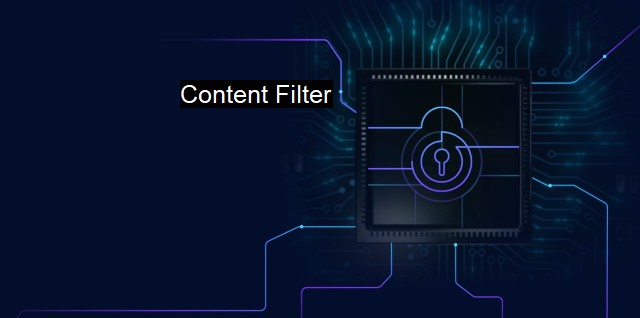What is Content Filter?
The Importance of Content Filters in Cybersecurity and Antivirus Software: Keeping Users Safe from Malware, Phishing Attacks, and other Threats
Content Filter, in vestiges of cybersecurity and antivirus, is an important tool that greatly benefits network managers and users alike. It's a technology designed to restrict or block certain types of content from being displayed, accessed or relayed over a network or from a user's computer. Substantially, the goal is to prevent exposure to inappropriate or sensitive content and protect against malware or virus attacks.An entrepreneur's successful feat is massively ingrained in their digital expanses. Personal data, customer information, and digital assets require unwavering security, a precursor to profuse hits of cyberattacks pervasive in the terrific digital age. And here kicks on stage our celestial character – the Content Filter, flashing its armor mighty in the cybersecurity.
Known both as web filtering and internet content filtering, this kindhearted companion discerns content before it can inseminate holes in vos defenses. Firmly put, it analyzes webpages, emails, and any other inbound packets of data, thus impeding potentially damaging content from leeching into the system.
A content filter operates in a meticulous fashion. Whenever a user thriftily sends or receives data, the filter scans for gamey keywords or phrases typed out and categorizes the data content. Once it reeks of something adorner, it curtails its egress, trapping unseen threats and shielding a computer network from devastating detonations of malware or viruses.
Unrelenting in cyclones of cyberattacks – damaging exploits, malware, ransomware, and more insidiously, the phishing attacks – a content filter tosses attackers into the void while fortifying cybersecurity defenses. it whisks about like a sentry worming out dangerous contents, flashing red alerts, and timely installing companies' security policies – an archetypal antivirus program, if you will.
Advocators of content filters lionize their proactive urge in pest-proofing systems. Unlike traditional antivirus which snags viruses post an incursion, a content filtering solution scans data pre-entry, serving twofold – censoring inappropriate or offensive content, at once stringently fortifying system prosperity from lurking malware damages.
Whilst defense against cyber threats might scale top in priority, content filters chimingly moonlight to battle perplexing mundane issues. Several businesses use content filters to block access to explicit, offensive, or inappropriate websites – a move to flout risks of sexual harassment or liability. An employee leisurely loafing and loafing over Facebook while ignoring workflow and deadlines is also warded off by encapsulating the habit under a filter "productivity."
Deploying content filters also burns brilliantly in protecting an organization from legal and compliance issues. A potential torrenting site, harboring a buffet run amok with copyright infringement allusions, could risk sizable legal fines which can surely be skirted by simple filtration settings.
Rest assured, expecting absolute eradication of cybersecurity threats via employing content filters might spell wishful thinking. Yet, adapting this, collaterally tagged with antivirus and stalwart security policies, weld predominantly beams of unabridged shielding against most digital threats. All in all, it relates thus – Content Filtering, like yin-yang, patters gravely along with an antivirus to shield digital assets, sidelining anxieties of compounded cyberattacks.

Content Filter FAQs
What is a content filter?
A content filter is a cybersecurity tool used to block or restrict certain types of content from being accessed or viewed by users. It can be used to prevent access to malicious websites, inappropriate or harmful content, and other online threats. Content filtering is an important aspect of antivirus and network security.What types of content can be filtered with a content filter?
A content filter can be used to filter a wide range of content, including websites, emails, instant messages, and other online communications. It can be used to block specific categories of content, such as adult content, gambling sites, social networking sites, or even specific keywords or phrases. The filter can be customized to meet the specific security and compliance needs of the organization.How does a content filter work?
A content filter uses a set of rules and algorithms to scan incoming traffic and analyze it for potential threats or inappropriate content. Based on the rules in place, the filter will either allow or block the content from being accessed. The rules can be customized to block specific categories of content, or even specific websites or IP addresses. The filter can also be configured to generate alerts or notifications when suspicious activity is detected.Why is content filtering important in antivirus and cybersecurity?
Content filtering is a critical component of antivirus and cybersecurity. It helps to prevent malware infections, phishing attacks, and other online threats by blocking access to suspicious or dangerous content. By restricting access to inappropriate or harmful content, it also helps to maintain a safe and secure online environment for employees and customers. Additionally, content filtering can help organizations to comply with regulations and industry standards related to data security and privacy.| | A | | | B | | | C | | | D | | | E | | | F | | | G | | | H | | | I | | | J | | | K | | | L | | | M | |
| | N | | | O | | | P | | | Q | | | R | | | S | | | T | | | U | | | V | | | W | | | X | | | Y | | | Z | |
| | 1 | | | 2 | | | 3 | | | 4 | | | 7 | | | 8 | | |||||||